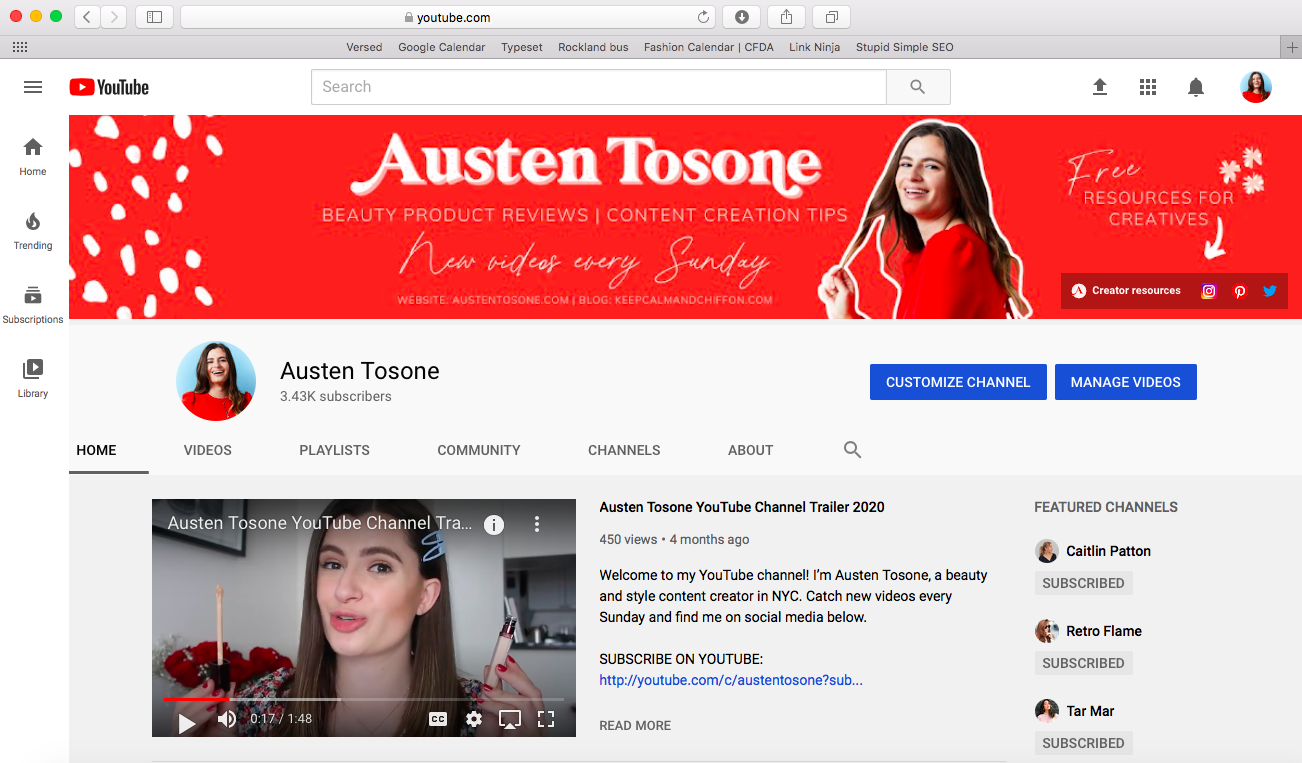Is YouTube a Job or a Hobby?
During a major shift to remote work, online learning, and industries that weren’t able to adapt to the pandemic it seems like more people than ever are looking to the world of social media to earn money.
I’d say that out of all of the platforms that I’m on the one I get the most questions about is YouTube. Where TikTok is all about virality and trends and Instagram is all about capturing moments, I’ve always been drawn to YouTube because it feels like the place where people can be real.
I’ve recently been thinking about how I started on YouTube and where I am now. Essentially, is YouTube a job or a hobby? So let’s break it down!
Is YouTube a real job?
For many people, YouTube is absolutely a real job. To use the beauty world as an example James Charles is probably one of the biggest YouTube stars who has about 22 million subscribers. Based on the number of views he gets on videos it’s estimated that from YouTube ad revenue alone he makes around $2.2 million a year. Sounds pretty real to me!
Even YouTubers with a mid-size audience like Erika Kullberg who has just over 50,000 subscribers have been able to generate $9k/month from ad revenue on YouTube according to Business Insider.
From these two examples you can see that it is very possible to make a living from YouTube. So now you might be wondering...
How do I turn my hobby into a job?
If you currently create YouTube videos as a hobby and you want it to stay that way, that’s totally cool! I started YouTube casually because I wanted to try a new way of creating content but in the back of my head I always pictured it becoming a bigger part of my blogging income. If YouTube is something you truly enjoy doing in your spare time you can stop reading now and keep on keeping on.
In my view there are a few things that change if you want to approach YouTube as a job:
Research: check out the top channels in the categories you’re thinking about creating content for
Planning: start to put together ideas of video topics and what you want to film
Commitment: deciding to commit to posting consistently whether that’s once a week or whatever makes sense for your schedule. I currently post once a week on Sundays.
How much time should you spend on YouTube?
I think what nobody tells you about being a YouTuber is how much time and effort goes into every single video.
When I first decided to start YouTube my plan was to film two videos: one intro video and then one get to know me video. I anticipated that it might take me an hour or two in the morning to put those videos together and BOY was I wrong.
Between getting ready, finding the right setup and background, checking my lighting and camera, jotting down bullet points for the videos, actually filming them and then uploading them to my computer (haven’t even mentioned the word editing yet!) it took me most of the day.
While now I know more about where to film and have tactics for making this process go a little bit faster, like batching content, it does still take me some time to film things.
When and how can you start earning money on YouTube?
There are a few ways you can monetize your YouTube channel (I’ll share a table below from YouTube about ways to monetize) but the two most popular ones are ads and sponsorships.
To join YouTube’s partner program and start earning ad revenue on your videos you first need 1,000 subscribers and 4,000 watch hours within 12 months on your channel.
“Ugh but Austen, that sounds like so much work.” It definitely is but if you’re wondering how to get subscribers and views on your channel, I have a whole video where I chat about what I’d do if I was starting YouTube from zero.
You can also earn money on YouTube from brand partnerships. This will involve you reaching out to brands or having them contact you to create sponsored content around a product or service for your YouTube channel. If you need help navigating the pitching process, read this.
From YouTube
So, is being a YouTuber worth it?
I’m going to say yes! Again if YouTube is a hobby for you, you can still have fun creating videos and uploading them to be part of the creator community with no expectation of monetizing.
If you are interested in consistently creating content for YouTube on one or two particular topics, you can learn skills like keyword research, camera techniques and more to make videos that get found on the site. My channel for example is focused on beauty product reviews and tips for beauty creators about how to make great content.
Just remember if you want YouTube to be a full-time income source or part of your income that you should try to diversify your revenue streams as much as possible.
Think about making ad revenue, working with brands, creating your own services like consulting or video editing, and even making products. Merch is a word you’ll hear lots of big YouTubers toss around but you can also start off with a low cost digital product like an e-book.
I hope you found this post helpful! Let me know if you have any questions.
yours,
Austen




